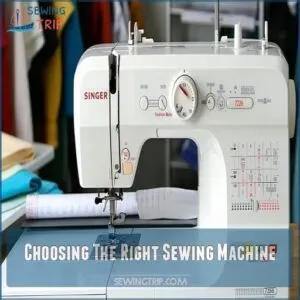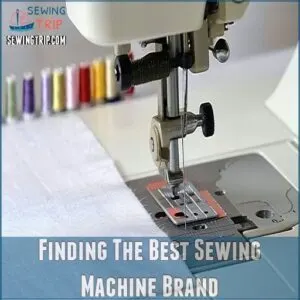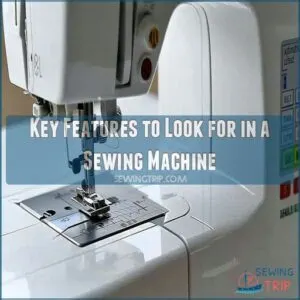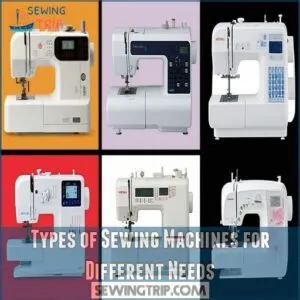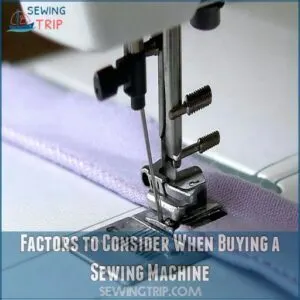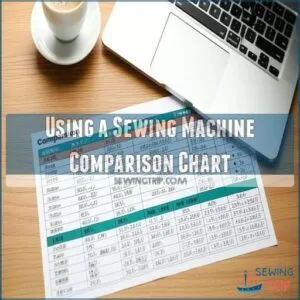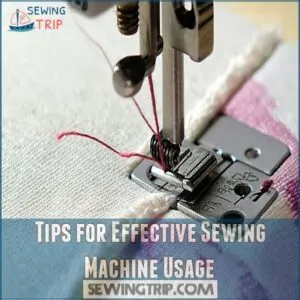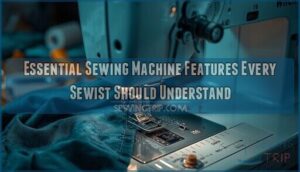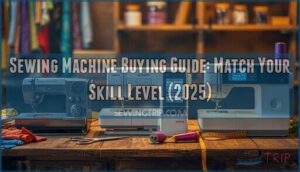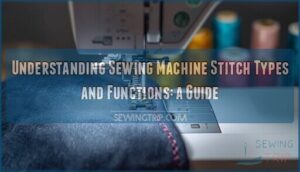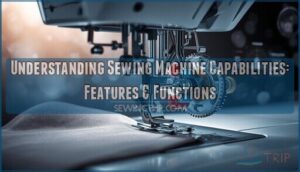This site is supported by our readers. We may earn a commission, at no cost to you, if you purchase through links.
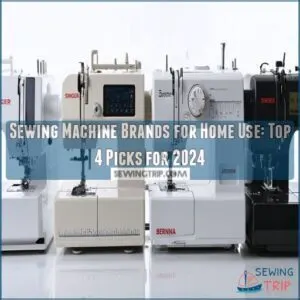
Singer and Brother, renowned for ease and affordability, suit beginners perfectly.
If you seek sophistication, Janome and Bernina offer high-end models with incredible precision.
Juki’s powerful machines are perfect for serious quilters, while Bernette, Bernina’s budget line, brings advanced features without breaking the bank.
Think about versatility and sturdiness, especially if tackling heavy fabrics.
Remember, selecting a brand is like picking a dance partner; it has to match your rhythm.
For deeper insights on best model choices and ensuring the best stitch quality, continue exploring our top picks!
Table Of Contents
- Key Takeaways
- Choosing The Right Sewing Machine
- Finding The Best Sewing Machine Brand
- Top 4 Sewing Machines for Home Use
- Key Features to Look for in a Sewing Machine
- Types of Sewing Machines for Different Needs
- Factors to Consider When Buying a Sewing Machine
- Using a Sewing Machine Comparison Chart
- Tips for Effective Sewing Machine Usage
- Frequently Asked Questions (FAQs)
- Conclusion
Key Takeaways
- Consider your skill level and project type when choosing a sewing machine; beginners may prefer simpler models, while advanced users might benefit from machines with more features.
- Brands like Singer and Brother are great for those new to sewing, offering ease and affordability, while Janome and Bernina provide sophisticated options for experienced users.
- Assess brand reputation and warranty support to ensure reliable performance and easy access to repairs if needed.
- Think about versatility and durability, especially if you’ll be working with heavy fabrics or need a machine that can handle diverse projects.
Choosing The Right Sewing Machine
When choosing the right sewing machine for your home, consider matching your skill level with machine features, whether you’re a novice or a seasoned sewist.
Evaluate your project types and check stitch quality through demos, ensuring you get a model that meets your needs with reliable warranty support.
Matching Skill Level With Features
How do you choose the right sewing machine for your skill level? It’s easier than you think!
For beginners, simpler mechanical models are perfect. They’re less overwhelming, affordable, and teach you the basics.
- Simple machines are great for learning.
- As you improve, consider machines with more features.
- Advanced features open up new creative avenues!
Considering Project Types
When you’re choosing a sewing machine, it’s like picking the right tool for the job.
Think about your "project types".
Are you into home decor, fixing clothes, making garments, or diving into quilting projects?
Here’s the scoop—different machines cater to specific needs.
For instance, some excel in small craft projects, while others handle large sewing endeavors with ease.
Checking Warranty Information
Understanding warranty details for your sewing machine can be as important as threading the needle itself.
Keep an eye out for warranty length, repair costs, and coverage details.
Favor brands offering authorized repair centers with speedy turnaround times.
It’s like having a sewing superhero on call, making brand support one of your best allies for home use.
Assessing Stitch Quality
Stitch testing is like taking your sewing machine for a test drive.
You want to try different fabric types to see how it handles tension control and needle types.
Seam finishes should be smooth and even.
Top sewing machine brands should deliver quality and consistency.
Check out sewing machine reviews to gauge overall stitch quality.
Finding The Best Sewing Machine Brand
When you’re looking for the best sewing machine brand, it’s important to weigh key features like stitch variety and durability.
Consider brands with a solid reputation and strong customer support to guarantee a smooth sewing experience.
Key Features to Compare
You’ve got the basics covered, now it’s time to focus on key sewing machine features.
Look for stitch options that offer variety, as well as speed—faster machines make quick work of big projects.
Automatic buttonholes and built-in needle threaders save time, while varied presser feet increase project versatility.
These features set excellent home sewing machines apart.
Brand Reputation and Customer Support
Before diving in, check a brand’s reputation.
Read customer reviews; they’re gold!
Look into warranty length and available repair services.
Reliable support resources matter.
Consider local servicing options for sewing machine durability.
Brand trust is key; it saves you headaches down the line.
Top 4 Sewing Machines for Home Use
When you’re choosing a sewing machine for home use in 2024, consider versatile options like the Singer 7285Q and the Bernette B79.
These models stand out for their robust features, balancing advanced technology with ease of use, making them excellent choices for every sewing enthusiast.
1. Singer 7285Q Quilting Sewing Machine
Exploring the Singer 7285Q Quilting Sewing Machine is like opening a treasure chest for quilting enthusiasts.
Known for its user-friendly interface, it offers versatility with 100 stitch options, including 15 just for quilting.
Imagine effortlessly switching projects with its automatic needle threader and speed control.
It’s not just for quilting; the sleek design fits any home.
Be aware, though, some users report hiccups with thicker fabrics and inconsistent buttonholes.
Still, this machine often feels like a reliable friend ready to help you create masterpieces.
Best For: Beginners and quilters looking for an easy-to-use machine with a variety of stitch options.
- Easy to use for beginners.
- Wide variety of stitches, including 15 quilting stitches.
- Automatic needle threader and speed control.
- May not be suitable for heavier fabrics.
- Inconsistent buttonhole function.
- Some users reported issues with the machine locking up and error code C4.
2. SINGER Quantum Stylist Sewing Machine
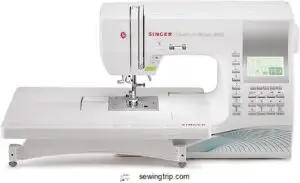
The SINGER Quantum Stylist Sewing Machine feels like your best creative ally.
Offering 600 stitch options and 13 automatic buttonhole styles, it’s perfect for those who want to elevate their sewing game.
With the option to purchase this model and its accessories at online marketplaces like SINGER Quantum Products, you can easily get started on your next project.
The smooth, swift operation at 850 stitches per minute gives you a confident, seamless experience whether you’re tackling thick denim or delicate embellishments.
With handy features like the automatic needle threader and top drop-in bobbin, this machine makes sewing feel less like a chore and more like a creative adventure.
Best For: This machine is best for beginners and intermediate sewers who want a versatile machine with a variety of stitches and features.
- The automatic needle threader and top drop-in bobbin system make threading a breeze.
- The machine can handle thick fabrics like denim and faux leather.
- The wide range of stitches and features allows for a variety of projects.
- The automatic thread cutter can be unreliable.
- The lettering stitches are not the machine’s strongest feature.
- Some users have reported issues with the automatic thread cutter.
3. Juki TL 2000Qi Sewing Quilting Machine
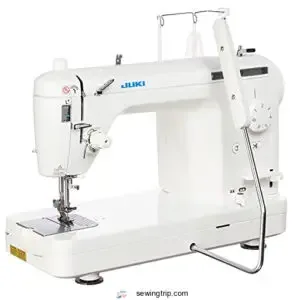
Innovation meets precision with the Juki TL 2000Qi, perfect for those craving mastery in quilting and beyond.
This heavy-duty machine, famed for quiet operation and speed, stitches up to 1500 SPM.
Its aluminum die-cast arm reduces vibrations, ensuring every stitch sings in harmony.
While it’s limited to straight stitching, the automatic needle threader and large work area offer freedom when tackling big projects.
Though hefty and simplistic, it’s a cherished companion for serious quilters seeking reliability and prowess in their creative endeavors.
Best For: The Juki TL 2000Qi is best for quilters and sewers who need a reliable, heavy-duty machine with a large work area.
- Quiet and smooth operation
- Automatic needle threader and cutter
- Large work area and extension table
- Only does straight stitching
- Heavy
- No motor adjustment button
4. Bernette B79 Computerized Sewing and Embroidery Machine
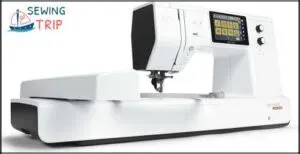
Choosing a sewing machine can be a bit like threading a needle in the dark—challenging, but rewarding with the right guidance.
The Bernette B79 stands out with its dual feed for even fabric management, though it requires costly embroidery threads.
Despite its slow startup and vague manual, its strong customization features make it appealing.
Keep in mind it’s not for heavy-duty projects, and parts may be tricky to find.
Perfect for those balancing creativity with reliability at home.
Best For: Home sewers looking for a machine with extensive embroidery and design customization options.
- Dual feed for fast and even fabric feed.
- Extensive design customization options with the edit module.
- Includes valuable programs for embroidery and design.
- Prone to malfunctions and requires significant troubleshooting.
- Machine is heavy and requires frequent cleaning and oiling.
- Accessories are difficult to find due to the machine being a new model.
Key Features to Look for in a Sewing Machine
When you’re choosing a sewing machine, focus on essential features like an automatic needle threader, built-in thread cutter, and durable construction to make your projects easier and more enjoyable.
These practical additions enhance your sewing experience but also save time and reduce frustration, helping you achieve professional results at home.
Automatic Needle Threader
An automatic needle threader? It’s a game-changer! Seriously, this feature saves you tons of time and frustration.
Many modern sewing machines, like those from Singer and Brother, boast this helpful tool.
There are different threader types, but most work smoothly. Troubleshooting is usually simple—check your thread and bobbin.
For beginners, an automatic needle threader is a must-have. It’s a fantastic feature, rating an 8/10 for ease of use. Consider it a small luxury that elevates your sewing experience.
Built-in Thread Cutter
A built-in thread cutter in a sewing machine can be your best friend, especially when you’re juggling fabric and pins. Here’s why:
- Convenience: No more hunting for scissors mid-project.
- Time-Saving: Quick snip action keeps your workflow smooth.
- Precision: Achieves neat thread ends, reducing tangles.
Consider these benefits when exploring sewing machines for home use.
Walking Foot and Presser Feet
Presser feet, your sewing machine’s trusty sidekicks, come in different types for varied tasks, including standard, zipper, and blind hem feet as outlined in a detailed sewing machine presser feet guide.
The walking foot’s a game-changer, tackling tricky layers with ease.
Checking foot compatibility makes sure you’re ready for any project.
Brands offer essential foot sets, making choosing the right foot a breeze.
Mastering these tools, you’ll sew with precision and freedom, like stitching a dream.
Free-Arm Capability and Durability
When you’re juggling intricate sewing projects, the free-arm capability is like having an ace up your sleeve—it makes handling cuffs and hems a breeze.
But don’t forget durability; it’s the backbone ensuring your machine stands the test of time.
Trust brands with stellar durability tests and smart design, so your sewing buddy is as reliable as your morning coffee.
Types of Sewing Machines for Different Needs
When choosing a sewing machine, considering the different types available can help you find the perfect match for your projects.
Whether you need a straightforward mechanical model, a high-tech computerized machine, or a specialized heavy-duty option, understanding their features will guide your decision.
Mechanical Vs. Computerized Machines
Choosing between mechanical and computerized sewing machines for home use is like picking a travel buddy—each offers unique perks.
Mechanical sewing machines are known for:
- Affordability and simplicity
- Lower maintenance needs
- Quick learning curve
- Fewer features
- Durability for basic tasks
In contrast, computerized models bring:
- Advanced features
- Higher price tag
- Easier use for complex projects
- More maintenance
- Steeper learning curve
Sergers Vs. Sewing Machines
Figuring out the world of sewing machines and sergers might feel like stitching a quilt in the dark.
But don’t worry, it’s simpler than threading a needle!
Understanding the differences between these machines is essential, as sergers are ideal for tasks like finishing knit fabric seams.
Here’s a quick comparison to illuminate your path:
| Feature | Sewing Machines | Sergers |
|---|---|---|
| Uses | General sewing | Edge finishing |
| Cost | Varies widely | Often higher |
| Benefits | Versatile | Professional finish |
| Best for Beginners | Beginner-friendly | Learning curve |
Specialized Sewing Machines for Heavy-Duty Use
So, you’ve mastered sergers? Great! Now, let’s talk heavy-duty machines.
These workhorses tackle tough fabrics like leather, denim, and canvas.
Think upholstery projects or multiple layers of quilting.
Top brands like Singer and Janome offer excellent heavy-duty options—perfect for home sewers needing that extra power.
They’re a must-have for tackling those extra-thick materials.
Factors to Consider When Buying a Sewing Machine
When you’re shopping for a sewing machine, consider factors like ease of use and versatility to match your skill level and project needs.
Brand reputation and warranty details will also guide you toward a reliable machine that offers enduring performance and peace of mind.
Ease of Use and Beginner-Friendly Features
Unlike choosing between mechanical and computerized machines, ease of use is key for beginners.
You’ll appreciate a sewing machine with beginner-friendly design, intuitive controls, and automatic threading, which is often associated with the best sewing machines for beginners that can simplify tasks like threading the needle.
Simple stitch selection keeps it stress-free, while a top-loading bobbin prevents tangling.
With trusted sewing machine brands, you’ll find the best sewing machines that feel like threading the needle just right.
Versatility and Multi-Functionality
You’ve got your sewing machine set up, the bobbin’s in place, and you’re ready to tackle any project.
But, have you thought about how versatile your machine really is?
Look for models with free-arm capability and a variety of presser feet options.
These features make a world of difference in tackling diverse home sewing projects with ease.
Brand Reputation and Warranty
When picking a sewing machine, brand reputation is your best friend.
Consider their history and customer support; it’s like choosing a friend who won’t ghost you in times of need.
Warranty length and repair options can spare you future headaches–think of them as sewing machine "health insurance."
Durable machines with local servicing options offer peace of mind.
Using a Sewing Machine Comparison Chart
When you’re choosing a sewing machine, a comparison chart is your best friend, breaking down technical details like stitch options and speed.
You’ll find it invaluable for balancing user reviews, features, and budget.
Ensuring you spend wisely while getting exactly what you need.
Interpreting Technical Specifications
How do you make sense of sewing machine specs?
Get into stitch count, speed, needle positions, and thread tension to gauge performance.
Compare bobbin types and assess how they align with your projects.
Whether eyeing top sewing machine brands or scouting a machine for home use, focus on features that match your needs and sewing ambitions.
Evaluating User Reviews and Ratings
User reviews are a gold mine! Don’t just glance; really examine them.
Look for patterns in customer feedback.
Reliability scores and long-term performance reports matter.
Here’s what to check:
- Consistent positive feedback on ease of use.
- Reports of dependable performance over time.
- Mention of helpful customer service.
- Absence of recurring negative comments about common issues.
Prioritizing Features and Budget
Balancing budget-friendly features and essential needs is key when sifting through sewing machine brands, and using a sewing machine features comparison chart can help you visualize the trade-offs.
Each offer unique benefits, but understanding trade-offs can steer you right: Checking out websites like sewing machine comparisons can give you a better idea of the features you need.
| Feature | Pros | Cons |
|---|---|---|
| Automatic Threader | Saves time | Higher price |
| Multiple Stitches | Versatile projects | Learning curve |
| Built-in Cutter | Quick fabric finish | Limited blade life |
Prioritizing features over price guarantees real value for money in home use.
Tips for Effective Sewing Machine Usage
To get the most out of your sewing machine, practice regular maintenance by cleaning and oiling its parts to guarantee smooth operation.
Explore advanced features and techniques, like using specialty feet and stitch settings, to enhance your projects and expand your creative possibilities.
Practicing Regular Maintenance and Cleaning
You’ve picked your top sewing machine; now, it’s time for maintenance.
Regular upkeep is like giving your machine a spa day, ensuring smooth sailing with every project.
To determine how often to clean your sewing machine, check out cleaning frequency guidelines.
Follow these tips:
- Cleaning Tips: Dust and lint are the enemies; keep them at bay.
- Lubrication: Keep parts moving like a well-oiled machine.
- Regular Schedule: Set reminders for consistent care and troubleshooting issues.
Exploring Advanced Features and Techniques
Sometimes, exploring sewing machine features feels like discovering hidden talents.
Unearth advanced options like custom embroidery or decorative stitches to elevate projects.
You can also find top-rated machines with these features on websites that offer the best home sewing machines online best home sewing machines.
Computerized sewing machines offer intuitive shortcuts, perfect for sophisticated quilting techniques.
Embrace troubleshooting tips for smoother sewing adventures, and don’t underestimate the power of simple hacks.
Mastering these techniques guarantees your creativity isn’t reined in by machine limitations.
Frequently Asked Questions (FAQs)
What is a good brand of sewing machine?
Choosing the right sewing machine depends on your needs.
Brother and Singer offer solid options for beginners and experts alike, boasting quality and a wide range of features.
Janome provides excellent value, too.
Which sewing machine should I buy?
Get started with sewing with a Brother XR9550 for versatility, Singer M3500 for value, or Janome MC6650 for quilting mastery.
Match your skill level with machine features, ensuring ease, durability, and support complement your sewing adventure.
What is the best multi-purpose sewing machine?
For a versatile sewing machine, consider the Brother XR9550.
It combines user-friendly features with advanced options, perfect for various projects like quilting and garment making.
You’ll appreciate its ease, offering control and creativity in every stitch.
Which Brother Sewing Machine is best?
The Brother CS7000X stands out as the best for versatility.
It’s perfect for beginners and seasoned pros alike.
It has an array of features like 70 built-in stitches, quilting table, and user-friendly controls, ensuring smooth operation.
Which sewing machine is best for quilting?
Think of quilting as crafting a cozy masterpiece.
Singer 7285Q Patchwork Quilting Machine and Janome MC6650 Sewing and Quilting Machine are top picks, offering versatile features like multiple stitch options and high-speed performance for your quilting projects.
Which sewing machine is best for heavy fabrics?
Go for the Singer 4452 Heavy Duty Sewing Machine when tackling heavy fabrics.
It’s built like a tank.
It handles tough materials with ease.
It offers impressive speed to help you zip through projects without any hiccups.
Is Brother or Singer a better sewing machine?
Choosing between Brother and Singer feels like choosing between two trusted friends.
Brother offers modern features and ease of use, ideal for tech-savvy beginners.
Singer shines with durability and versatility, perfect for those who value tradition and versatility.
What is the average price of a good sewing machine?
A good sewing machine’s price varies wildly, from $100 for a basic model to over $1,000 for advanced features. You’ll find something great in the $200-$500 range, though.
How do I choose a sewing machine for my house?
Selecting a sewing machine feels like picking a trusty steed: match your skill with features, prioritize ease of use, and consider your project type.
Prioritize ease of use and consider your project type.
Opt for warranty support, durability, and essential functions like stitch variety and speed.
What is the best easiest to use sewing machine?
The Brother CS7000X is your go-to for ease of use, featuring intuitive controls, an automatic needle threader, and versatile stitching options.
It simplifies learning, letting you sew confidently without frustration.
It is great for beginners.
What are the most durable sewing machines?
You’d want a durable sewing machine like the Singer Heavy Duty 4452 or the Janome HD
These machines, with metal frames and powerful motors, handle thick fabrics efficiently and last longer.
Offering serious sewing enthusiasts reliability and strength.
Are sewing machines energy efficient for home use?
Think sewing machines guzzle power like vacuums?
Not quite.
Most modern machines are pretty efficient, barely sipping energy while you stitch your masterpieces.
It’s a win-win, keeping both your projects and energy bills manageable.
How often should a sewing machine be serviced?
Service your sewing machine every 12-18 months to keep it purring smoothly.
Regular maintenance helps avoid snarled threads and sticky gears.
If you’re sewing daily, consider more frequent check-ups for best performance and longevity.
Can sewing machines handle different fabric types?
Absolutely, sewing machines can handle various fabrics like silk, denim, and knits.
You’ll want to adjust settings and choose the right needles and presser feet for smooth stitching.
To prevent fabric damage.
What safety features do modern sewing machines offer?
Imagine this: needle-in-eye threading, automatic needle stops, and built-in safety switches prevent accidents. You’ll find many modern machines have these helpful features. Sewing’s safer than ever!
Conclusion
Starting your sewing journey is like threading the needle of creativity, where choosing the perfect sewing machine brands for home use is vital.
Whether you pick Singer for simplicity, Janome for precision, Juki for power, or Bernette for versatility, each brand has something unique.
Consider your projects and skill level when deciding, ensuring the machine matches your rhythm.
Explore these 2024 picks, and let your creative stitches make beautiful, lasting impressions on every piece you sew.

